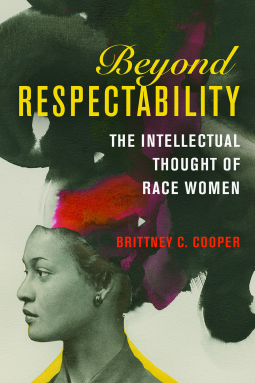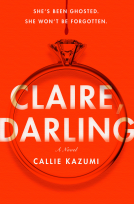
Beyond Respectability
The Intellectual Thought of Race Women
by Brittney C. Cooper
This title was previously available on NetGalley and is now archived.
Send NetGalley books directly to your Kindle or Kindle app
1
To read on a Kindle or Kindle app, please add kindle@netgalley.com as an approved email address to receive files in your Amazon account. Click here for step-by-step instructions.
2
Also find your Kindle email address within your Amazon account, and enter it here.
Pub Date Jun 01 2017 | Archive Date May 23 2017
Description
Beyond Respectability charts the development of African American women as public intellectuals and the evolution of their thought from the end of the 1800s through the Black Power era of the 1970s. Eschewing the Great Race Man paradigm so prominent in contemporary discourse, Brittney C. Cooper looks at the far-reaching intellectual achievements of female thinkers and activists like Anna Julia Cooper, Mary Church Terrell, Fannie Barrier Williams, Pauli Murray, and Tony Cade Bambara. Cooper delves into the processes that transformed these women and others into racial leadership figures, including long-overdue discussions of their theoretical output and personal experiences. As Cooper shows, their body of work critically reshaped our understandings of race and gender discourse. It also confronted entrenched ideas of how--and who--produced racial knowledge.
Brittney C. Cooper is an assistant professor of women's and gender studies at Rutgers University.
Advance Praise
"At the cutting edge of black women's intellectual history, Brittney Cooper weaves together the ideas and lived experiences of women heretofore known as activists rather than thinkers. Through exacting analysis, a feminist lens, and her signature verve, Cooper establishes the centrality of black women's ideas to twentieth century political thought. This is a pathbreaking history of ideas."--Martha S. Jones, author of All Bound Up Together: The Woman Question in African American Public Culture, 1830–1900
"Brittney Cooper's Beyond Respectability....makes an important contribution to a large body of scholarship that analyzes the long history of Black women's intellectual discourse. Focusing on the feminist theorizing of selected 'race women,' especially Fannie Barrier Williams, Anna Julia Cooper, Mary Church Terrell, Pauli Murray, and Toni Cade Bambara, Cooper probes their interior lives in new ways and makes more visible the complexities of their public stances. Her brilliant analysis and queer reading of Murray's life is perhaps its most compelling revisionist intervention."--Beverly Guy-Sheftall, coeditor of Words of Fire: An Anthology of African Feminist Thought
Available Editions
| EDITION | Paperback |
| ISBN | 9780252082481 |
| PRICE | $25.95 (USD) |
| PAGES | 208 |
Links
Featured Reviews
 Krystal Kavita J, Media/Journalist
Krystal Kavita J, Media/Journalist
This book deconstructs the scholarship of black women about their existence, challenging such layers as race, class, and gender, with attention to detail, spanning historical thought to present.
 Philipa C, Reviewer
Philipa C, Reviewer
It is some time since I have read a highly researched theoretical book and although my degree studies may have touched on aspects of equality and sociology, this book by acclaimed feminist Professor Britney C Cooper did stretch my ability to take in many concepts.
Overall the historical context of black women intellectuals and activism in the US was well outlined and I was intrigued to discover more about some of the prominent figures particularly Fannie Berrier Williams and Mary Church Terrell. After all, we are familiar with much of the life and speeches of Martin Luther King. But as Cooper outlines many black women felt alienated from the educational, intellectual and political activism developing during the 19th century and even through the Civil Rights movement of the 1960s and 70s.
The descriptions of Anna Julia Cooper (not related) as "The Mother of Black Feminism" give readers a backdrop to the vocalisation of many women,, often brought up enslaved, now seeking education in places like Oberlin College and the NACW (National Association of Colored Women).
Women, through schools and often churches, defied the discrimination of black men against their sex and achieved much social improvement within US society.
However, as we still see today with 'Black Lives Matter' , the segregation continues.
Despite what some women fought for and could never have believed in the election of President Barack Obama, the feminist ideology would still have resented the position of equally intelligent First Lady, Michelle Obama as somewhat still encapsulated in her role as 'First Lady'.
As with many intellectuals the disputes, even amongst the women are exposed and often made me also feel that 'class' was(and still is) an overarching reason for inequality. How many of those in US society who are mostly being discriminated against would ever read this book?
There is also discussion of more recent black feminists such as Pauli Murray, who struggled with her sexuality compounding upon her 'blackness'. Speeches leading to violence are described as the Civil Rights Movement clashed with Black Power and for me there seemed an anger generally 'against' all men whether white or black.
However in troubling times that we see since the election of President Trump and resurgence of right wing ideologies, we must continue to allow the exploration and writing of intellectuals such as Cooper and hope the younger generations (of all colours) will try to overturn the rapid growth of hostility to those of other races, religions or sexual orientation that are seemingly marching forward.
 Lisa H, Librarian
Lisa H, Librarian
Cooper does an excellent job of addressing the unrecognized struggles and triumphs of black academic women. It's a bit academic for public libraries, but could be a more serious title for someone who has finished the quick essays that Cooper contributed to the Crunk Feminist Collection.
 T V, Reviewer
T V, Reviewer
Satisfies Both the Academic, Black Woman, and Historian in This Reader
This important work uncovers, or probably more accurately, RECOVERS, Black women's thought. In a world not prepared to hear them, this text combines an astute analysis with a fine hand with primary sources. Recommended for reading, teaching, and reference.
Readers who liked this book also liked:
John Kotter; Holger Rathgeber
Business, Leadership, Finance, Nonfiction (Adult)







